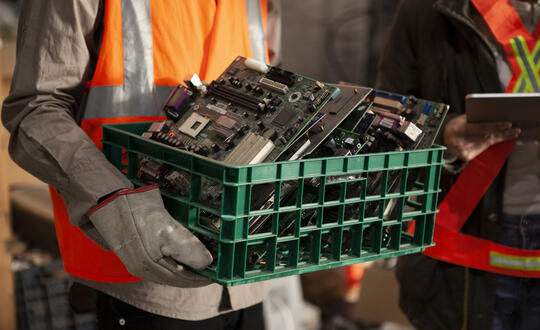
Have you heard about the European Commission's Green Deal or the Circular Economy Action Plan?
Are you aware that new legislation is being considered in the European Union on the theme of sustainability and the circular economy?
You might be aware of these topics but have consigned them to the "I'll worry about that later" pile. That would be an understandable approach knowing that the new legislation is a number of years off and that it will be applied at EU member state level.
In this briefing note we tell you why you need to be taking notice of these developments now, if your business manufactures or supplies products into the EU.
What new legislation is being considered at EU level?
The European Green Deal is the European Union's new agenda for tackling the "climate emergency" while maintaining sustainable growth. It aims to transform the EU into a modern, resource-efficient and competitive economy, and for the EU to achieve climate neutrality by 2050. Hence, delivering on the so called "energy trilemma".
The Circular Economy Action Plan is described by the European Commission as being one of the main building blocks of the European Green Deal. It aims to make sustainable products the norm in the EU, reduce waste, and lead global efforts on circular economy and resource management. The plan focuses on high-impact sectors like electronics, construction, waste, plastics, textiles, air quality, and food. It looks at the life cycle of products and materials, and how the cycle as a whole can be made more sustainable. There is a focus on making sure that consumers are given good, and accurate, information so they can make sustainable purchasing choices.
As part of this initiative, the EU is carrying out a colossal review of legislation on the areas listed above. This review exercise has been concluded for some pieces and is still underway for others.
The table below lists some of the legislation relevant to consumers: new rights and better protection for consumers and access to more sustainable products.
| Legislation | Scope | Status |
| Empowering Consumers for the Green Transition Directive | Contains new measures to give consumers in the EU the information and protection they need to make more sustainable purchasing choices. For example, better clarity over the guarantees offered on consumer goods (both the legal guarantee and any commercial guarantee from the manufacturer). | The Directive has been formally adopted by the European institutions and entered into force on 26 March 2024. Member states have 24 months to transpose it into national law and 30 months to enforce it. Businesses need to start complying with the Directive from September 2026. |
| The Right to Repair Directive | Contains new measures to make it easier for consumers to get defective or broken goods repaired. The idea being that consumers can repair existing goods rather than just buying new ones. | March 2024 status: not yet formally adopted by all of the required EU institutions but provisional agreement was reached on 1 February 2024 so formal adoption is anticipated soon. |
| The Green Claims Directive | Contains new criteria to make sure that environmental labels and claims are accurate so that consumers in the EU can make better informed purchasing decisions. | March 2024 status: under review by the EU institutions at present. |
| The Ecodesign for Sustainable Products Regulation | Creates an extended framework concerning the ecodesign requirements of specific product groups. The current framework only covers energy-related products (such as fridges and water pumps). The proposed framework will apply to most physical goods sold in the EU though food and feed are excluded. | March 2024 status: under review by the EU institutions at present. |
Does the Circular Economy Action Plan prioritise sustainability over the need for businesses to make a profit?
In the introduction to the Circular Economy Action Plan the European Commission references a United Nations study that found that we are over consuming in proportion to the resources available on our planet. If the world's population continues to increase then by 2050 we will need the equivalent of three planets to sustain current lifestyles.
It is clear that the European Commission considers that change is needed in Europe to create a climate-neutral and resource efficient economy. And yet, the Circular Economy Action Plan also talks about a more competitive Europe and points to a number of ways in which the plan can achieve this. For example, manufacturing businesses can increase profitability by reducing their spend on materials. The Commission also sees great potential for innovation and entrepreneurship amongst SMEs.
What will this new legislation mean for Europe and beyond?
The new legislation will mean that European member states are more streamlined in terms of their regulatory framework on sustainability. Businesses outside the EU which trade into the EU will need to comply with that framework, where relevant. Compliance should theoretically be easier given that there will be unified rules across EU member states, particularly for businesses that supply into multiple EU member states.
We can anticipate that jurisdictions outside of the EU will adopt similar legislation in the future. The UK is already considering similar measures and last year published an updated waste prevention programme for England that covers most of the areas of the Circular Economy Action Plan.
What should you do next as a business which supplies products into the EU?
Businesses won't need to comply with the new legislation until 2026 at the earliest (some of the legislation could be later still).
Now is the time to get to know the new legislation and to monitor how it is transposed into national law in the member states in which your business operates. You need to consider how you will respond to the new requirements in your internal processes and what it might mean for labelling, packaging, marketing, and documentation.
As we get closer to 2026, you will need to think about what it means for your existing and future contracts and business relationships within the EU.
But don’t panic yet! You might actually not be that far away from complying with the new requirements, if you remember that similar changes are happening in the UK.
Where can you read more about the European Green Deal and the Circular Economy Action Plan?
A good starting point is to read the European Commission's webpages about the Circular Economy Action Plan. If you want to know more on the mother policy of this plan, take a look at the European Green Deal.
We will be writing briefing notes, giving an introduction to the new legislation tabled above, as it is adopted by the European institutions. Watch this space for our briefing on the Empowering Consumers for the Green Transition Directive!
Do you want to know more about how the Circular Economy Action Plan might impact on your contracts and your trading relationships in Europe?
Simply reach out to Peter Snaith or Sarah Daun.
This article is for general information only and reflects the position at the date of publication. It does not constitute legal advice.







